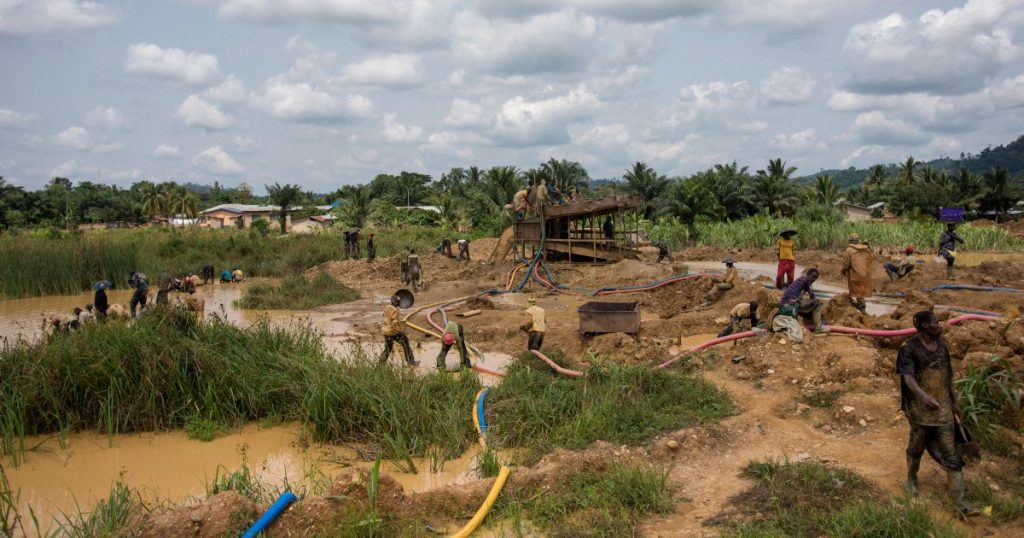Ghana’s Struggle Against Galamsey: A Looming Environmental Catastrophe
Ghana, a nation once renowned as the Gold Coast, is grappling with a devastating environmental crisis fueled by the relentless pursuit of gold through small-scale mining, locally known as “galamsey.” Originally referring to illegal mining operations, galamsey now encompasses both illicit activities and licensed small-scale mining practices that often disregard environmental sustainability. The surge in global gold prices in recent years has intensified galamsey, exacerbating the degradation of Ghana’s water resources and threatening the livelihoods of countless communities. The mining process involves excavating soil around riverbeds, often within forested areas, and using toxic chemicals like mercury and cyanide to extract gold. These chemicals contaminate rivers, which serve as primary sources of drinking water and domestic use for many Ghanaians, leading to health problems and agricultural devastation.
Activism and Government Response: A History of Frustration
Concerned citizens, like activist Oliver Barker Vormawor, have taken to the streets to protest against government inaction on galamsey, facing arrest and imprisonment for their efforts. The frustration stems from a perceived lack of commitment from both the previous and current administrations to address the root causes of the problem. While the Akufo-Addo administration introduced legislation intended to regulate mining activities, critics argue that the law, LI 2462, actually facilitated the expansion of mining concessions into protected forest areas, exacerbating deforestation and environmental damage. Allegations of corruption and political involvement in galamsey further fueled public anger, adding to the perception that the government was prioritizing economic gain over environmental protection.
The Mahama Administration: A Glimmer of Hope or More of the Same?
With the recent election of John Mahama, there is a renewed hope, albeit cautious, for more decisive action against galamsey. Mahama has pledged to prioritize environmental protection, promising to ban mining in forest reserves and near water bodies and to collaborate with the Environmental Protection Agency to clean up polluted rivers. However, his reluctance to revoke existing small-scale mining licenses or impose a moratorium on new concessions raises concerns about the extent of his commitment to addressing the issue. Mahama argues that small-scale mining provides livelihoods and should be distinguished from illegal mining, suggesting a focus on promoting responsible mining practices rather than outright bans.
The Complexities of Galamsey: Livelihoods vs. Environment
The galamsey dilemma highlights the complex interplay between economic development and environmental sustainability. While small-scale mining offers a source of income for many Ghanaians, especially in rural areas, the unregulated and often destructive nature of these operations poses a severe threat to the country’s natural resources and the health of its citizens. Finding a balance between preserving livelihoods and protecting the environment is a crucial challenge for the Mahama administration. Critics argue that focusing solely on responsible mining practices without addressing the underlying issues of corruption, weak enforcement, and lack of oversight will not be sufficient to curb the devastating impacts of galamsey.
The Looming Water Crisis: A Call for Urgent Action
The consequences of inaction are dire. WaterAid, a non-governmental organization, warns that Ghana may face a severe water shortage by 2030 if galamsey continues unchecked, potentially forcing the country to rely on imported water. The contamination of water bodies with mercury and other heavy metals not only poses health risks but also threatens agriculture, particularly cocoa cultivation, a major contributor to Ghana’s economy. The urgency of the situation demands a comprehensive and decisive approach, one that goes beyond rhetoric and addresses the systemic issues that enable galamsey to thrive.
The Future of Ghana’s Environment: A Shared Responsibility
The fight against galamsey requires a collective effort. The government must strengthen regulations, enforce existing laws, and invest in sustainable mining practices. Civil society organizations and activists must continue to raise awareness, advocate for policy changes, and hold the government accountable. The international community can play a role by supporting initiatives that promote responsible mining and environmental protection. Ultimately, the future of Ghana’s environment depends on the collective will to prioritize sustainable development over short-term economic gains. Only through concerted action can Ghana address the galamsey crisis and secure a healthy and prosperous future for its people and its environment.

